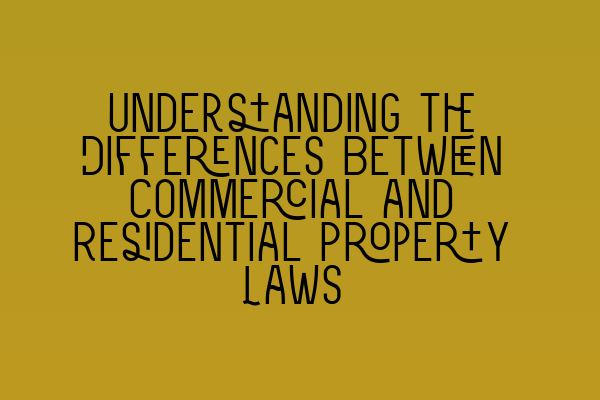**Understanding the Differences Between Commercial and Residential Property Laws**
When it comes to property law, it is important to understand that there are distinct differences between commercial and residential property laws. Whether you are a solicitor specializing in property law, a landlord, tenant, or simply someone interested in real estate, having an understanding of these differences can be immensely beneficial in navigating the legal landscape. In this blog post, we will explore the key dissimilarities between commercial and residential property laws, shedding light on their distinct regulations and requirements.
**Residential Property Laws:**
Residential property laws pertain to properties primarily used as dwellings, such as houses, apartments, or condominiums. These laws are designed to protect the rights of both tenants and landlords, ensuring a fair and balanced relationship between the two parties. Let’s explore some of the key features of residential property laws:
1. **Tenancy Agreements**: Residential tenancy agreements outline the terms and conditions governing the rental of a property. They include details such as rent amount, duration of the tenancy, responsibilities of both parties, and termination clauses. It is essential for both tenants and landlords to have a clear understanding of the terms outlined in the agreement.
2. **Security Deposits**: In many jurisdictions, residential landlords are allowed to collect security deposits from tenants. These deposits serve as a form of protection for the landlord in case of damage to the property or unpaid rent. Laws regarding security deposits vary, so it is crucial for both parties to familiarize themselves with the regulations in their specific jurisdiction.
3. **Maintenance and Repairs**: Residential property laws typically place the responsibility for maintenance and repairs on the landlord. However, tenants are generally required to notify the landlord or property manager promptly of any issues or damages. Landlords must ensure that the property is maintained in a safe and habitable condition for tenants.
4. **Evictions**: Residential property laws often provide specific procedures for evicting tenants if they violate the terms of the tenancy agreement, fail to pay rent, or engage in illegal activities. These procedures typically require landlords to provide notice to tenants and may involve a legal process if the tenant refuses to vacate the premises.
For a more detailed understanding of residential property laws, you may find this article on [Misrepresentation in Contracts: Unveiling Deceptive Practices](https://contract-law-sqe.co.uk/misrepresentation-in-contracts-unveiling-deceptive-practices/) insightful.
**Commercial Property Laws:**
Commercial property laws govern properties primarily used for business purposes, such as office buildings, retail establishments, and industrial spaces. These laws address the unique requirements and considerations involved in commercial real estate transactions. Here are some important aspects of commercial property laws:
1. **Lease Agreements**: Commercial lease agreements are more complex than residential tenancy agreements. They often involve negotiations between parties and can cover a wide range of terms, including rent structure, lease term, maintenance responsibilities, and tenant improvements. It is crucial for both landlords and tenants to have a thorough understanding of the terms agreed upon in the lease agreement.
2. **Zoning and Land Use**: Commercial property laws encompass zoning and land use regulations. These laws dictate how properties can be used, the types of businesses that can be operated in specific areas, and requirements for permits or licenses. Compliance with zoning and land use regulations is essential to avoid legal complications.
3. **Property Condition**: Unlike residential property laws, commercial property laws place the responsibility for property maintenance and repairs on the tenant. However, lease agreements can include provisions specifying the extent of tenant responsibilities and the landlord’s obligations. It is crucial for both parties to clearly outline these responsibilities in the lease agreement.
4. **Dispute Resolution**: Resolving disputes in commercial property cases often involves specialized processes, such as mediation or arbitration. These alternative dispute resolution methods aim to provide an efficient and cost-effective way to settle disagreements between landlords and tenants.
For more in-depth information about commercial property laws, you may find this article on [SQE Contract Law: Analyzing Landmark Cases and Influential Judicial Decisions](https://contract-law-sqe.co.uk/sqe-contract-law-analyzing-landmark-cases-and-influential-judicial-decisions/) beneficial.
**Conclusion:**
Understanding the differences between commercial and residential property laws is crucial for all parties involved in real estate transactions. Whether you are a solicitor, landlord, tenant, or prospective buyer, having a clear understanding of these legal frameworks will enable you to navigate the intricacies of property law effectively.
For an in-depth understanding of property law or to enhance your legal knowledge, you may find our related articles on [Understanding Contractual Capacity: Rights and Limitations](https://contract-law-sqe.co.uk/understanding-contractual-capacity-rights-and-limitations/), [Interactive SQE Mock Tests for Contract Law: Test Your Knowledge](https://contract-law-sqe.co.uk/interactive-sqe-mock-tests-for-contract-law-test-your-knowledge/), and [Join Our SQE Contract Law Webinars: Expert Insights and Guidance](https://contract-law-sqe.co.uk/join-our-sqe-contract-law-webinars-expert-insights-and-guidance/) valuable resources.
At SQE Property Law & Land Law, we are committed to providing comprehensive legal services and expert guidance in property matters. Our team of experienced solicitors is well-versed in both commercial and residential property laws, ensuring that our clients receive the best legal support tailored to their specific needs. If you require any assistance or have any inquiries regarding property law, do not hesitate to contact us today.
